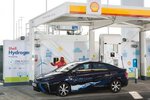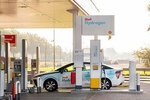JohnDe
La dolce vita
- Joined
- 11 March 2020
- Posts
- 4,556
- Reactions
- 6,698
You sound like an ICE driver, talking about how many EV's sold 20 years ago.
When was the first electric car sold in Australia?
2008
Australia's first electric car: The Blade Electron
The Blade Electron was an Australian electric car produced in Victoria between 2008 and 2014. Based on a Hyundai Getz, powered by a 55kW electric motor, with an approximate range of 120 kilometres.

VFACTS 2023: More than 87,000 EVs sold last year - carsales.com.au
Aussies bought more than one million new petrol and diesel cars in 2023, but EVs are growing fastwww.carsales.com.au
20, 30 years ago I was not an EV fan. Went to industry shows and technical conferences and saw that we were not even close to have EVs on the road in commercial quantities. Tesla changed all that.
Hydrogen is another that I have watched for a long time, even had a retired engineer develop his own Hydrogen powered car in the back of our business, converted an old Torana. the biggest problem with hydrogen is the cost of the fueling system, tanks and safety.
Another blow for hydrogen power as energy giant closes refuelling stations
One of the world’s largest energy companies is shutting down its refuelling stations in the US, blaming "market factors".
Hydrogen-powered passenger cars in the US have been dealt another blow, with energy giant Shell closing all of its Californian refuelling stations as hydrogen fuel-cell electric vehicles (FCEVs) fail to fire.
As reported by Forbes, Shell’s hydrogen division announced last week it would immediately close all seven of its refuelling stations in California, citing “supply complications and other external market factors”.
The company’s decision now means there are fewer than 50 hydrogen stations for passenger cars in California – and fewer than 100 US-wide – a number which is expected to drop given the extremely low percentage of hydrogen fuel-cell vehicles (FCEVs) sold compared to electric vehicles (EVs).
In 2023, just 2968 new FCEVs were sold in the US, all of which were in California. The sales race was dominated by the Toyota Mirai (2737 sales), with the Hyundai Nexo contributing just 241 examples to the total.
By contrast, more than 1.2 million EVs were sold in the US last year, with more battery-powered models being sold every day than FCEVs.
Shell’s announcement represents a major walk back from the British energy giant, which was the first company to open a hydrogen refuelling station in the US, doing so in Washington D.C. back in 2005.
Hyundai Nexo
Toyota Mirai
The company also last year announced plans to open an extra 48 hydrogen refuelling stations in California – a move which would have almost doubled the state’s total – having been awarded US$40.6 million (A$62.2 million) in government funding, though this has now been cancelled.
Registrations of new FCEVs in Australia have also been on the decline, with just six new examples registered last year – four Toyota Mirais and two Hyundai Nexos.
Both vehicles are not sold to the public and are only available on lease deals to organisations approved by the manufacturers, and have access to the fewer than 10 refuelling stations located across New South Wales, Victoria, Queensland and the Australian Capital Territory.
The six FCEVs sold in Australia last year represented a 60 per cent decrease on 2022, and a stark contrast to the 161 per cent rise in EV sales, with 87,217 new battery-powered vehicles registered in 2023.



